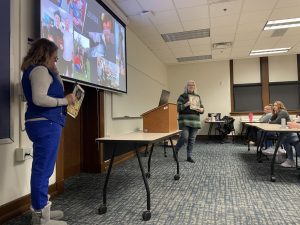WSU students to distribute COVID-19 vaccine
February 17, 2021
Many of Winona State University’s College of Nursing and Health Sciences students are preparing to distribute COVID-19 vaccinations.
The Minnesota Department of Health (MDH) will be deciding when the vaccine will be distributed to each county of the state, and while Winona has yet to distribute any doses to the public, Winona County Public Health has already been preparing and working with Winona State for mass vaccinations for the public, according to Sandy Herron, chairperson of the university’s nursing department.
Roughly 150 students in Winona State’s College of Nursing and Health Sciences from the university’s Winona and Rochester campuses will be working in vaccination clinics to distribute the vaccine, once it is made available.
Herron said although neither the Rochester campus or Winona campus has begun the distribution process, both are “ready and waiting.”
“Winona County Public Health has been working very closely with the nursing department to become those mass vaccinators,” Herron said. “We haven’t received a large batch to the county [of the COVID vaccine] but we’re ready, ready and waiting.”
Herron is currently working with Winona State’s Rochester campus students and said students there have begun the vaccination process.
Olmsted County, which the WSU-Rochester campus is part of, does not yet have mass vaccination clinics set up but contacted Herron when the county was given a number of vaccine doses to distribute to “prioritized” students.
According to the MDH website, individuals in phase or tier “1a” will be able to receive the vaccination first. Following tier 1a is phase 1a-first priority, 1a-second priority and 1a-third priority.
Tier 1a includes health care personnel, such as those working in hospitals, first responders and “COVID testers”, as well as residents of long-term care facilities.
Herron said prior to this, the university was given direction to develop a “priority list” for the entire nursing and health sciences college who fit into “priority tier 1a” and the following three phases to decide which students would receive the vaccine first.
“That first priority is those that will be providing the vaccine. The Minnesota Department of Health and Winona County Public Health have those priorities already defined for us, so we just had to identify the students that would be involved in those particular activities,” Herron said.
Herron said because nursing students fit into the first priority tier, it was decided they would be targeted first for the available vaccine doses.
“The thing that I think people get slightly confused about is that we have no control over where we are in that vaccine administration as far as what priority or which tier we’re in, all of that comes from [the] Minnesota Department of Health, down to the county public health offices,” Herron said.
Some areas within the state of Minnesota are on a different tier or priority, Herron said, meaning there could be large variances between which counties begin mass vaccinations to the public and which have to wait longer.
“I think that’s the part that’s disheartening; when people hear where we’re at, and we’re really in a holding pattern until we’re allotted a certain number of vaccines,” Herron said.
For the WSU-Rochester campus, the students deemed able to receive the vaccine were sent email invitations to sign up via an electronic calendar and were then able to go to the RCTC center to have their injection, Herron said.
Based on the priority list of students made by the university that was sent to the MDH, the MDH was able to send enough vaccine doses to Olmsted County to “take care of that priority 1a,” according to Herron.
Students part of the Student Nurses Association may also volunteer to give extra time towards administering vaccinations.
However, students are not required to get COVID vaccinated.
Dean of the College of Nursing and Health Sciences, Julie Anderson, said while the university may encourage its students to get the vaccine, it is ultimately each students’ choice.
“It can’t be a requirement at this time; it can’t be mandated anywhere in the country because it was an emergency authorization by the FDA, so we strongly encourage our students [to get COVID vaccinated], but it’s the students’ choice,” Anderson said. “There’s no repercussions if they choose not to get the vaccine.”
Anderson emphasized how the college’s students are not only learning about the vaccine and how to distribute it, but about the epidemiology of the pandemic as a whole.
Anderson also said students studying Public Health and others taking public health courses are very much tied to the pandemic, as public health material also touches on disasters and pandemics.
“One of the Public Health courses deals with disasters, pandemics, things like that, so this pandemic unfortunately fits into that course,” Anderson said. “The action part is giving the vaccine, but they really have to have an understanding of what a pandemic is.”
Students studying nursing and health sciences have a public health sector in their curriculums, and those currently in that sector will be on the frontline, making them part of the first priority group to receive the COVID vaccine.
“The United States has had in the back of its mind for some time that we could have another pandemic, but it [COVID] came upon us rather swiftly and it truly is unprecedented times,” Anderson said. “It challenges each of us in our commitment to do what we as Warriors feel we need to do and follow the guidance that’s out there.”
Anderson said she encourages people to get vaccinated once it is available to them, especially the Winona State community.
“We just really want to be of service to the community and to the Winona city itself,” Anderson said. “If we can help provide that manpower [we will].”
Anderson herself was currently in the process of receiving her vaccination doses as of Feb. 12.
“Every student is important to us, as are the employees of Winona State,” Anderson said. “I just want people to know, when they have a chance to get the vaccine, I want to encourage them [to get vaccinated].”

































